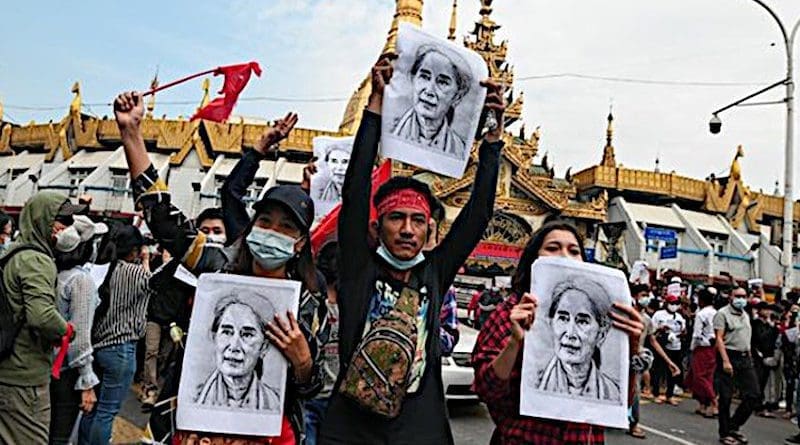Myanmar: Fallen Heroes Buried After Bloody Saturday
By UCA News
The nation mourns the deaths of at least 114 people who were killed by security forces on March 27
While Catholics in Buddhist-majority Myanmar observed Palm Sunday, there were tears and grief as the funerals of dozens of fallen heroes were held in several cities and towns.
The people of Myanmar were mourning the deaths of at least 114 people who were killed by security forces on March 27, the bloodiest day yet since the military seized power on Feb. 1.
Dozens of Bloody Saturday’s victims were bystanders who were not taking part in the demonstrations. Among those who were killed were three children aged five, 13 and 14 along with scores of young people.
A man from Mandalay, Myanmar’s second-largest city, was shot and burned alive by security forces on March 27 night, according to local media.
Bishop John Saw Yaw Han, auxiliary bishop of Yangon Archdiocese, called on Catholics to earnestly pray to bring peace to Myanmar.
“As Christians, we ourselves need to practice the way of justice and at the same time we need to fight against injustice,” the prelate said in a homily on March 28.
Priests who held Masses on Palm Sunday also prayed for the fallen heroes who sacrificed their lives during the pro-democracy protests.
“God is at our side in every affliction, in every fear; no evil, no sin will ever have the final word,” Pope Francis said in a Mass on Palm Sunday.
The pontiff, who has spoken out against Myanmar’s repression four times, is among the world leaders to call on the military to end the bloodshed and pursue dialogue.
Cardinal Charles Bo of Yangon recently demanded a stop to the killings in the streets of Myanmar.
The military, known as the Tatmadaw, has killed more than 450 people and detained at least 2,000 since the nationwide anti-coup protests began on Feb. 6.
Dr. Sasa, a spokesman for elected officials representing Myanmar’s government, condemned the massacre on March 27, a day of shame for the armed forces.
“These murderers are meant to be the protectors of our people. But through their horrendous, repeated crimes, they can no longer call themselves the country’s armed forces,” Sasa, an ethnic Chin and Christian politician, said in a statement on March 27.
The bloody crackdown took place on Armed Forces Day, formerly known as Revolution Day and a holiday honoring the Tatmadaw which was founded by Aung San, the father of Aung San Suu Kyi.
Revolution Day marks the date in 1945 when General Aung San began the resistance against the Japanese occupying forces during World War II.
Parade of strength
The Tatmadaw showed its might and weapons during a parade in Naypyitaw, the remote capital. Most Western diplomats boycotted the event, although officials from other countries including China and Russia attended.
General Min Aung Hlaing, the coup leader, said the army was determined to protect people from all danger. He pledged to pave the way for democracy and hold new elections without giving an exact time frame.
The Tatmadaw justified its coup by citing voting irregularities in last November’s elections that Suu Kyi’s National League for Democracy won by a landslide.
Bloody Saturday drew strong condemnation from the world including the United States, Britain, the European Union and 12 military chiefs from democratic countries including Japan.
“A professional military follows international standards for conduct and is responsible for protecting — not harming — the people it serves,” military chiefs said in a statement.
US President Joe Biden on March 28 called Myanmar’s massacre of pro-democracy protesters “absolutely disgraceful.”
The EU mission in Myanmar said “it’s a day of terror and dishonor” as the killings of unarmed civilians, including children, are indefensible acts.
Tom Andrews, special rapporteur on Myanmar, said it was time for the world to take action, if not through the UN Security Council then through an international emergency summit.
He said the junta should be cut off from funding such as oil and gas revenues, and from access to weapons.
No one is safe
Thousands of pro-democracy protesters have joined a leaderless movement against the military, while the Civil Disobedience Movement joined by thousands of health workers, bankers and railway workers among others has brought the economy to a standstill.
Security forces have unleashed a terror campaign on the public, shooting people in the streets and even in their homes, arbitrarily beating and arresting people.
Politicians, activists, students, journalists and ordinary civilians have been terrorized by the Tatmadaw. Soldiers raid homes late at night, randomly shooting at the houses.
The Tatmadaw’s actions have signaled a clear message: “No one is safe.”
The Southeast Asian nation, which had been under harsh military rule for more than five decades, is mired in turmoil following the coup that toppled Suu Kyi’s elected government, abruptly ending a 10-year experiment with democracy.
Undeterred by threat and live bullets, the young generation continue to march into the streets to show their defiance against military rule.
“I believe we will reach our goal through perseverance despite the journey being tough and facing more bloodshed,” said Sister Ann Rose Nu Tawng from Myitkyina, Kachin state’s capital, who knelt on the road to plead with security forces not to harm unarmed civilians in February and March.

